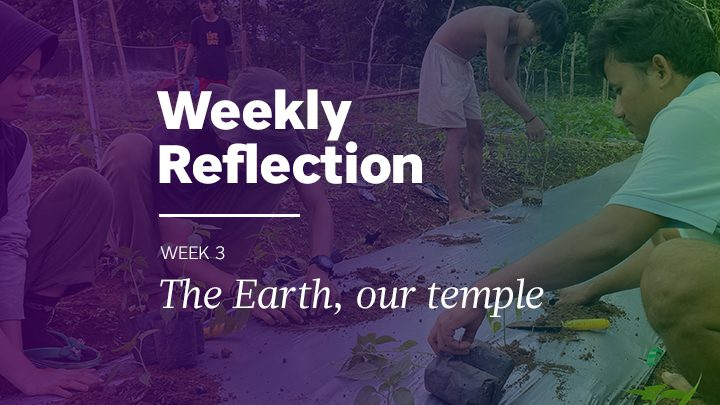

Readings
Exodus 20:1-17
Psalm 18b (19):8-11
1 Corinthians 1:22-25
John 2:13-25
“Take these things out of here! Stop making my Father’s house a marketplace!”
― John 2:16
The Earth, our temple
By Nicolas Kalgora, animator for the Maritimes
Some seemingly contradictory biblical accounts may sow doubt in the minds of many readers. Such is the case with the Gospel for the third Sunday of this Lent, which reveals a Jesus who appears to be the very opposite of the one we are often presented with.
Usually, Jesus, the Man and God and Prince of Peace, is presented as tender, gentle, humble, and preaching love of neighbor to forgiveness to the point of urging that “if anyone strikes you on the right cheek, turn the other also” (Mt 5:39). Jesus, the Son of God, is merciful and slow to anger like his Father. But where does this “anger” of Jesus in the Temple of Jerusalem come from?
The answer lies in what Jesus himself said when summoned to justify Himself and His action. In His response, there is a misunderstanding between Jesus and his interlocutors. Indeed, there are two Temples: one of Jesus (the Temple of His body) and the other of his interlocutors (the Temple of Jerusalem). Regardless of which Temple we consider, Jesus’s answer can be summed up as follows: My Father’s House is sacred, it must not be soiled or polluted. On the contrary, my it must be respected and cared for. That is not what you are doing, and that is why I am doing it.
In our time, what if the Temple―the House of God of which Jesus speaks―was an overexploited Earth on which wars were killing thousands of innocent people?
Let’s look at the Temple of Jerusalem, a place of worship. The merchants and money changers mistakenly believed they could do whatever they wanted within the Temple walls: sell, buy and trade goods without a care. The Earth―our common home, to borrow Pope Francis’s term―increasingly seems to be suffering the same fate. How many of us recognize that the Earth does not belong to us, that we are merely its stewards? Land is sometimes sold or resold at exorbitant prices because someone got there first or bought it. Sometimes it is usurped by force or grabbed for other purposes. All too often, the Earth is harmed just to allow multinational corporations to exploit natural resources, with no respect for communities that have inhabited affected lands for generations.
The Temple of Jerusalem was sacred to Jesus. This is exactly the regard that many Indigenous and peasant communities have for the Earth. They are aware that they have inherited it from their ancestors and will have to leave it to their children, to future generations. For them, the land, the water, the forests ―in short, God’s Creation―is sacred.
This Lent, the peasant communities we are highlighting are tackling climate change. We know that human activity, especially overexploitation for maximum profit, is unfortunately contributing to global warming. In contrast, the rural and peasant communities supported by our partners practice small-scale farming, which provides them with healthy food and helps care for the Earth. They respect and look after the land, water and forests.
Our Indonesian partner PAYOPAYO works with village communities to find solutions to common challenges related to agriculture, food, energy, sustainable resource management and youth engagement. Encouraging young people by teaching them about agriculture and rural entrepreneurship with a view to better farming practices is a way of preaching, a way of sowing in the hope of reaping much fruit for the glory of the Father. The fruit here is the healthy use of the land for earning a living, while respecting the environment. Without young people being involved, this kind of agriculture will have no future, because there will be no one to carry on the work of older generations. Training young people to work the land underlines the communities’ desire to produce food locally rather than importing it from elsewhere. Because importing food requires larger-scale farming and transport over many kilometers, which contribute to global warming.
To conclude, let’s ask how Jesus would have acted had he arrived at the Temple and found people sweeping; cleaning the benches and walls; adorning and beautifying the sacred space; or even praying or proclaiming the word of God. Let’s also ask ourselves how we care for the Earth, our common home.

